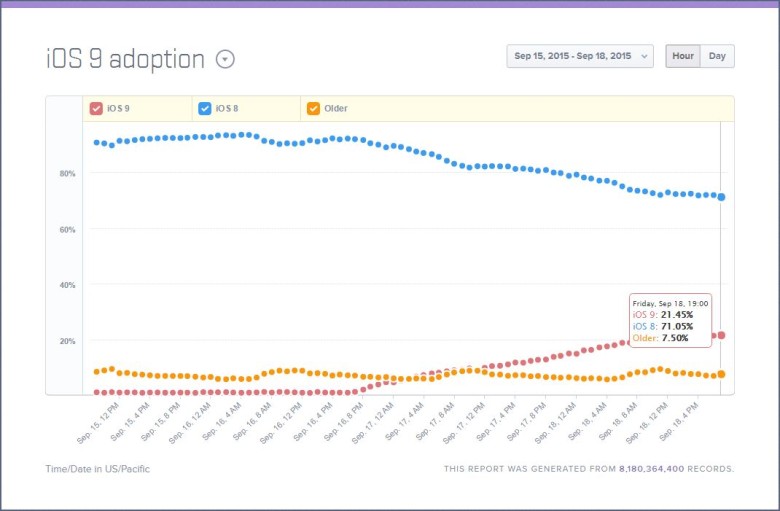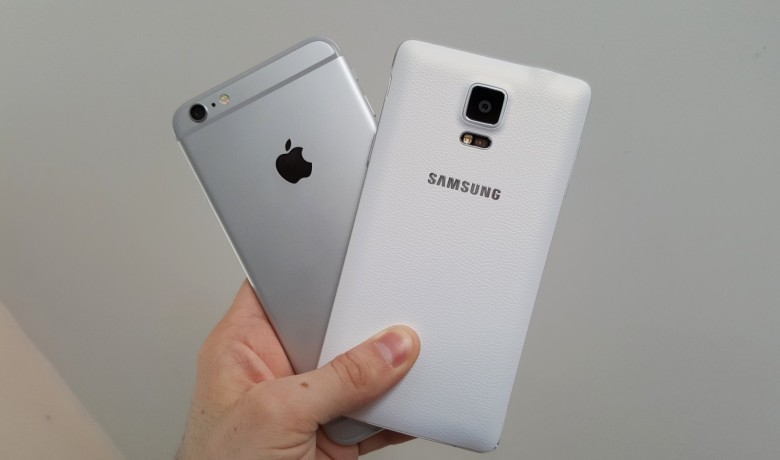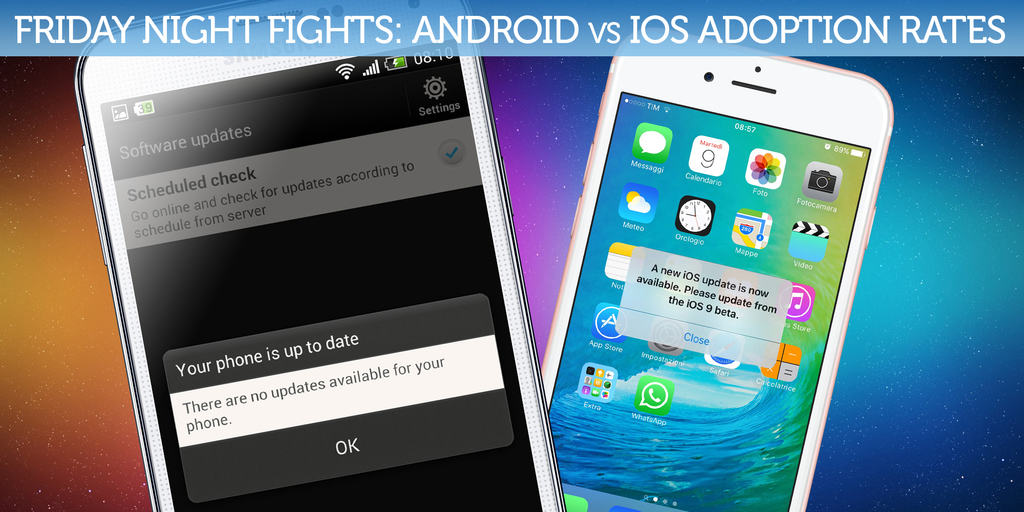iOS 9 has been out for two days, and it’s already running on more than 20 percent of compatible devices, according to the latest data. In comparison, Google’s latest Android release, version 5.1 Lollipop, is running on just 5.1 percent of devices ten months after it made its public debut.
 These figures highlight the staggering difference between updates on Android and iOS. But is it fair to compare adoption figures between these two platforms, and do users really care?
These figures highlight the staggering difference between updates on Android and iOS. But is it fair to compare adoption figures between these two platforms, and do users really care?
Join us in this week’s Friday Night Fight between Cult of Android and Cult of Mac as we battle it out over this very topic!
 Luke Dormehl (Writer, Cult of Mac): Happy Friday Night Fight, Killian!
Luke Dormehl (Writer, Cult of Mac): Happy Friday Night Fight, Killian!
This week was a big one for both Apple and its users. We saw the launch of iOS 9 which, according to live data from Mixpanel, is already at more than 20 percent adoption. iOS 8 adoption, meanwhile, finally topped out at 87 percent.
That’s slightly down from what iOS 7 achieved for a number of reasons, but it still amounts to almost 9 out of every 10 eligible users upgrading to what was then Apple’s latest mobile OS. That’s a phenomenal achievement, which says a lot about Apple users and how engaged they are with their platform.
When I was writing about this earlier in the week, I pointed out how much astonishingly better it is than Android’s dismal record for getting users to upgrade. The company’s most recent Android version, Lollipop, has 21 percent adoption. That means that, possibly by the end of today, iOS 9 will have managed in three days what it took Android the best part of a year to do.
That’s pathetic — and it’s indicative of some of the bigger problems Android faces. My question is, is it fair to compare these figures, and what — barring Fandroids packing in their Samsung handsets and joining us over here at Team Apple — would it take to change things?

Photo: Mixpanel
 Killian Bell (Writer, Cult of Android): It’s great that iOS 9 is already off to a promising start — and that Apple can boast about its iOS adoption figures every year. It’s one of the clear advantages iOS has over Android, and I don’t see Google’s OS ever being able to match it.
Killian Bell (Writer, Cult of Android): It’s great that iOS 9 is already off to a promising start — and that Apple can boast about its iOS adoption figures every year. It’s one of the clear advantages iOS has over Android, and I don’t see Google’s OS ever being able to match it.
Having said that, I don’t think it’s fair to compare iOS adoption figures with those of Android.
Android is open-source, so Google lets almost anyone use it and adapt it for their own devices. Most people see that as a good thing. But without full control over the OS, it’s impossible for Google to ensure that Android users get the latest updates as soon as they’re available.
It’s not that Android users have the option to update to the latest software as soon as it rolls out and simply choose not to; in some cases, it can take manufacturers a year to make the latest Android updates available to their customers.
The other important thing to remember is that unlike Apple, Google’s hardware partners don’t just release one or two smartphones every year. Motorola has a number of devices in its lineup — as does LG, Sony, HTC, and all the others. I won’t even get started on how many Samsung churns out within a 12-month period.
It’s simply not feasible to update all of these devices as soon as the latest Android update is out. The software has to be optimized for each one, and that’s a process that takes time. These companies cannot build operating systems for 20 devices in just a few months. And if they did, those operating systems would be terrible.
While Android’s adoption figures may seem “pathetic,” then, I think it’s silly to suggest they could ever match those of iOS. It’s just not possible with the way things are, and it would be exactly the same situation for iOS if Tim Cook went crazy and made that open-source.
Maybe Google could do something to improve the situation slightly — perhaps introducing a rule that forces hardware makers to update all the devices they’ve released in the last 12 months within 6 months of an update’s release.
But that would be too difficult to enforce, and it would likely upset a lot of partners, so it’s not going to happen.
 Luke: It may not be “fair” to compare, but there’s a lot that’s not fair — like the major security lapses Android devices suffer because of this fragmentation. Stagefright was a great recent example of this. Google knew about it for three months before even the best Android devices started getting the necessary improvements to stop their users’ data from being compromised.
Luke: It may not be “fair” to compare, but there’s a lot that’s not fair — like the major security lapses Android devices suffer because of this fragmentation. Stagefright was a great recent example of this. Google knew about it for three months before even the best Android devices started getting the necessary improvements to stop their users’ data from being compromised.
It may be a tough thing to fix, but this is one of the fundamental problems with the Android system. With dozens of partners, Google can’t control bugs because of the total lack of uniformity. We’ve talked Android security before and it doesn’t seem to get any better.
Compare that to iOS and, while there certainly have been bugs discovered in the system, Apple always solves them as quickly as possible. It’s not good enough, and it’s tough to work out what Google could do differently. A rule like the one you suggest would be a good idea, but it still means response time is significantly slower than iOS — if such a rule was possible to implement to begin with.
The other thing I’d be interested to see, and I don’t know if you can get figures for this, but what percentage of eligible Android users upgrade given the chance? It’s one thing to say that Android users don’t have the ability to upgrade because of the lack of available updates. But do Fandroids upgrade if they have the opportunity? Because just about every study shows how much more engaged users are with iOS: from spending more money on it to spending longer within apps. The fact that Apple gets so many people to upgrade isn’t just about the fact that it pushes out its software updates so quickly; it’s that iOS users care enough to upgrade.

Photo: Killian Bell/Cult of Mac
 Killian: There’s no excuse for Stagefright and other vulnerabilities like it, but Google and several of its partners — including LG and Samsung — have already vowed to improve security with monthly patches for all devices. This means that as soon as a major flaw is discovered, it can be eliminated much more quickly. So it’s not like Google or anyone else is ignoring the security concerns.
Killian: There’s no excuse for Stagefright and other vulnerabilities like it, but Google and several of its partners — including LG and Samsung — have already vowed to improve security with monthly patches for all devices. This means that as soon as a major flaw is discovered, it can be eliminated much more quickly. So it’s not like Google or anyone else is ignoring the security concerns.
The other thing I should note about those security updates is that carriers will be making them available to customers much faster than regular Android updates, which can be in testing for months before they’re finally approved and made available to customers. This is another hold up, and another reason why Android’s adoption figures aren’t as good.
Yes, I do think most Android users upgrade when they can. Suggesting they don’t because they don’t “care enough” is just clutching at straws to support your argument, I think.
Sure, there will be a certain percentage that don’t — maybe because they don’t know how to — but that’s going to be the case on every platform, including iOS. I’m pretty sure my granddad is still running iOS 7 on his iPad because he doesn’t like the idea of having to learn new features.
 Luke: I won’t ask at what stage the Bell family went from upstanding Apple-using citizens to no-good Android lovers.
Luke: I won’t ask at what stage the Bell family went from upstanding Apple-using citizens to no-good Android lovers.
I’m not “grasping at straws” to support my argument. Check out this ComScore study, for instance, which lays out clearly that iPhone owners are so-called “power users” who are much more likely to engage in all major content categories than Android owners. It follows, at least to me, that more engaged users would also be much more likely to upgrade to the latest mobile OS. I’m not just saying this to get some yucks laughing at Android users; I’m pointing out that a) Apple’s ability to get people to upgrade isn’t something we should take for granted and b) it’s not clear that Google could emulate the model if they wanted to.
Ultimately, it would be great to see Android pull it together and find a way to lessen the Android fragmentation problem (wasn’t it Tim Cook who called it a “toxic hell stew”?), but I just don’t see it happening. It would great to see some proactive steps on their part though. I like that 12-month rule you suggested… even if it is hard to imagine it being implemented.
I can pretty much guarantee that, one year from now, we’ll be talking about iOS 10, while Android adoption won’t have substantially changed from what it is today.
 Killian: How dare you bring my family into this. I’ll have you know I’m the only Android user in the house, but that doesn’t mean they love me any less. (I don’t think.)
Killian: How dare you bring my family into this. I’ll have you know I’m the only Android user in the house, but that doesn’t mean they love me any less. (I don’t think.)
I don’t care about any ComScore study. There are huge differences between Android and iOS that make those things inaccurate. For instance, Android caters to everyone — including those who only want to spend $100 on a smartphone to do email — and they don’t need other apps.
Plus I think many Android users would argue that Google’s platform is better suited to “power users” than iOS is. A platform that prevents you from swapping default apps, downloading and managing files, customizing your interface to suit your needs, and more isn’t exactly ideal for power users.
No, Google couldn’t emulate Apple’s model for reasons I’ve already mentioned, and as I’ve already stated, Android will never catch up with iOS when it comes to adoption figures. At no point have I tried to convince you otherwise. But I don’t think Google, any of its partners, or many Android users really care about that.
Yes, you have to wait ages to get updates if you don’t buy a Nexus device with pure Android. But every Android fan knows that, and yet they continue to buy into the platform anyway.
Today’s debate was about whether it’s fair to compare adoption rates, and I think I’ve provided good reasons why it isn’t. But that’s enough from us — let’s turn this one over to the readers now and see what they make of it.
Is it fair to compare the adoption figures or Android and iOS? And does anyone really care?
Friday Night Fights is a series of weekly death matches between two no-mercy brawlers who will fight to the death — or at least agree to disagree — about which is better: Apple or Google, iOS or Android?


